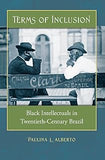In this history of black thought and racial activism in twentieth-century Brazil, Paulina Alberto demonstrates that black intellectuals, and not just elite white Brazilians, shaped discourses about race relations and the cultural and political terms of inclusion in their modern nation.
Drawing on a wide range of sources, including the prolific black press of the era, and focusing on the influential urban centers of Sao Paulo, Rio de Janeiro, and Salvador da Bahia, Alberto traces the shifting terms that black thinkers used to negotiate their citizenship over the course of the century, offering fresh insight into the relationship between ideas of race and nation in modern Brazil. Alberto finds that black intellectuals' ways of engaging with official racial discourses changed as broader historical trends made the possibilities for true inclusion appear to flow and then recede. These distinct political strategies, Alberto argues, were nonetheless part of black thinkers' ongoing attempts to make dominant ideologies of racial harmony meaningful in light of evolving local, national, and international politics and discourse. Terms of Inclusion tells a new history of the role of people of color in shaping and contesting the racialized contours of citizenship in twentieth-century Brazil.




